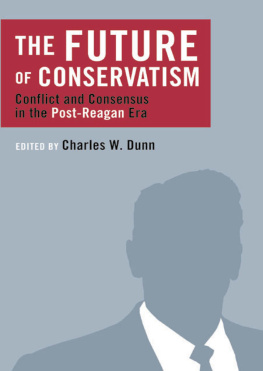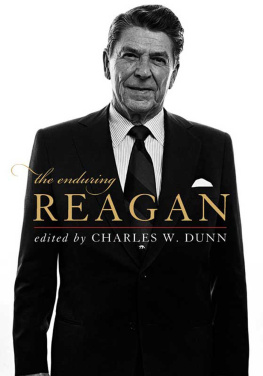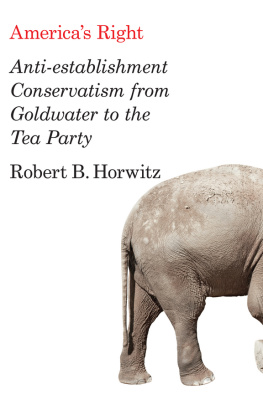Introduction
Conservatism on Center Stage
Charles W. Dunn
The future, as always, is veiled from our vision. But for the moment the conservative intellectual movement in America, born in the wilderness a generation ago, has undeniably achieved an unprecedented level of influence and importance.
George H. Nash
CONSERVATISM, ONCE ON THE wings of the American political stage, now plays a leading role. But despite its emergence as a powerful political force, misunderstandings abound about conservatism's meaning and natureeconomically, philosophically, politically, religiously, and socially.
In 1860, Abraham Lincoln provided a succinct definition of conservatism at New York City's Cooper Union: Is it not adherence to the old and tried, against the new and untried? lacks a significant tradition in America, it has contributed more to American life than is usually acknowledged. Fifth, although it is usually thought to instill homogeneity among its adherents, in truth conservatism is marked by a great deal of intellectual heterogeneity. And sixth, although the public views it primarily as a political movement, conservatism's strength rests less in the realm of pragmatic politics than it does in the realm of ideas. In other words, conservatism in America is far from monolithic.
Conservatism Defined
Yet despite this complexity and the manifold differences among conservatives, the following definition captures the mainstream of conservative thought. Conservatism is the defense of inherited political, economic, religious, and social traditions from the forces of abrupt change, based upon the belief that to maintain continuity and stability in society, established customs, laws, and mores should guide change.
To amplify this definition by contrasting it with liberalism, conservatives generally (1) place more emphasis on orthodox and traditional religious values, (2) express less faith in the goodness, reason, and perfectibility of mankind, (3) voice greater opposition to the power of centralized government, (4) place a greater emphasis on state and local governments than they do the national government in the federal system, (5) identify with nationalism more than with internationalism, and as such tend to be less supportive of the United Nations and other international organizations, (6) express a more fervent patriotic spirit, (7) put greater emphasis upon the responsibilities and duties of individuals than upon their rights, (8) trust capitalism and free markets more than government regulation in determining economic policy, and (9) believe that gradual changes within existing institutions offer the best way to ensure society's economic, political, religious, and social health.
Ten Canons of Conservatism
This process of comparing conservatism to liberalism helps to give us an idea of its shape. But given the complexity of conservatism, does it offer a generally accepted set of principles? Do certain ideas almost always mark conservatism, regardless of its myriad manifestations? In a nutshell, can conservatism be boiled down to several readily identifiable canons? By synthesizing the conservative tenets articulated by a variety of conservative thinkers, it is possible to answer yes to this question. The ten canons presented here represent a sort of conservative intellectual synthesis.
First, continuity stands out as the most widely accepted canon of conservative thought, which comes as no surprise, because conservatives place a high value on order in society. Preferring organic change to revolution, conservatives oppose large-scale and abrupt alterations that disrupt and unsettle society. Their respect for the past reflects a desire to incorporate change within existing community institutions, standards, and traditions, making continuity from generation to generation the most essential canon of conservative thought.
Second, authority manifests itself as a natural corollary of conservatives preference for continuity in social order. Conservatives believe that the government must protect society from foreign challenges and domestic disturbances that would disrupt the continuity of community, but critics sometimes attack conservatives for an apparent contradiction between supporting increased government spending for the protection of society and accusing the government of over-taxing and over-spending. But a coherent philosophy rests beneath this seeming contradiction. Because of a passion for order, conservatives believe that the government's primary function is to protect society against foreign threats and to keep order at home. Conservatives see the government as the most effective means of protecting against the selfish appetites of men, such aggression being manifest in both the aggression of foreign nations and domestic disregard for civil authority. On the other hand, because conservatives believe in incremental and organic change, they distrust efforts to alter society through centralized governmental power and planningwhich, of course, require high taxes and spending. For conservatives, the primary purpose of government is to protect, not alter, organically developed human society.
Third, community must come near the top of a list of fundamental conservative tenets, for conservatives believe communities provide the structure for organic change and serve as a countervailing force against the power that is concentrated in government. Conservatives also believe that human flourishing is nourished by the individual's inclusion within a dense web of private and voluntary organizations, including professional associations, churches, service groups, universities, trade unions, newspapers, private businesses, and local governmental institutions.
Fourth, deity holds a place on most lists of conservative tenets, if for no other reason than this: conservatives usually believe in traditional moral values, and are distrustful of human nature. Put another way, they believe that natural or divine law transcends human law, which makes man and government ultimately accountable to God.
Fifth, duty or personal responsibility ranks higher in conservative thinking than does the concept of individual rights. When rights come to trump individual responsibilities, conservatives contend, citizens come to think more about what government can do for them rather than what they can, and ought to do for themselves. This leads not only to statism, but also to social and moral decay.
Sixth, democracy in the conservative mind exists within the context of a constitutional order carefully designed not only to limit and separate governmental power, but also to refine democratic opinion and encourage deliberation. Because the Constitution circumscribes in precise terms governmental activity, conservatives advocate its strict interpretation, contending that the courts should interpret the law rather than make it, thereby observing the original intentions of the founders in framing the American constitutional system.
Seventh, property and its ownership enable individuals to have a greater stake in society, according to conservatives, who maintain that when people are tied in this concrete way to their communities, they are more likely to function as responsible citizens who desire to preserve the social order. A sound social order not only creates opportunities for people to own property, thereby strengthening their ties to the community, but it also helps them to rise in economic and social status. The opportunity to own property is therefore basic to a humane and free society.






